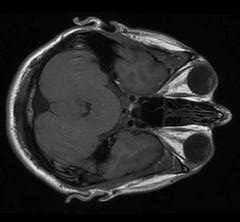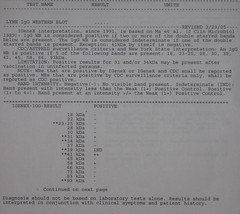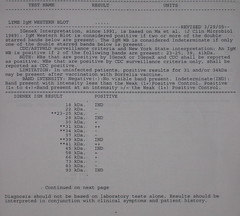Results from quack lab
The Lyme test results from IgeneX were positive, not ambiguous. If you want to read these, click the image and then once inside Flickr, click "All sizes."
My neuro talked their doc by phone, and their doc said these were positive results "consistent with long-term Lyme disease." The IgeneX doc said ceftriaxone may not dig it out, since the Lyme invaders can hide in cysts in the spinal column. Flagyl (sp?) is recommended.
He said they've seen 70 to 80 cases of people thought to have ALS who improved with treatment for Lyme, including a Colorado doctor, Dave Martz, who was himself cured, and devoted his practice to Lyme, but is now not working due to a pulmonary embolism.
My neuro seemed enthusiastic about this information, though not giggly and swooning. I'm willing to be treated with Flagyl, but I also would like to get the same tests done by another lab. My tests by Quest in December 2003 and again in December 2004 showed ambiguous results for Lyme, not a strong positive.
I used IgeneX because of their supposed expertise with Lyme tests. They are being investigated by the state of New York for improper methodology. On August 23, 2005, Dan Hurley and Marc Santora of the New York Times published a piece called "Unproved Lyme Disease Tests Prompt Warnings."
The New York Times hides content behind free registrations, so I can't provide a URL, but here are some bits of the article:
Now the New York State Department of Health has opened an investigation of the California laboratory, IGeneX Inc., that issued Mr. Courcier's positive result, after receiving eight complaints from doctors and patients who said its Lyme tests also gave them positive results not confirmed by other labs' results.
Concern about Lyme testing goes beyond New York State. This year the Food and Drug Administration and the Centers for Disease Control and Prevention released a warning about Lyme tests "whose accuracy and clinical usefulness have not been adequately established."
The warning did not mention IGeneX or any other lab by name. But Dr. Paul Mead, a C.D.C. scientist who helped write it, said in a telephone interview, "Quite simply, we're concerned that patients are being misdiagnosed through the use of inaccurate laboratory tests." He added that some of the tests and techniques used by IGeneX were among those the agencies were concerned about.
[...]
The recent warning by the two federal agencies named some tests they said had not proved useful or accurate. They noted, for instance, that some laboratories performed a test called polymerase chain reaction "on inappropriate specimens such as blood and urine." IGeneX offers such tests on both blood and urine. The alert also warned against methods of interpreting Western blots "that have not been validated and published in peer-reviewed scientific literature."
[...]
But Robert Kenny, a spokesman for the State Department of Health, said the agency was not convinced that IGeneX was performing the recommended tests for the public in the same manner as it has been performing them to pass the state's proficiency review.
Moreover, Mr. Kenny said IGeneX had not supplied requested proof that its urine antigen test can be used to accurately diagnose Lyme disease.
I used to write a newspaper column. One from 1989 describes a camping trip I took. This part documents that I was bitten by a tick:
"When we got to the parking lot we changed into our road clothes. I pulled a tick from my calf with a clockwise half turn."
I don't recall a rash from that.
In the years since, I've done plenty of jogging on off-road trials with trees and wild grasses. In the couple of years before my symptom onset (characterized by my running getting weaker), I made a point of regular runs in the hills, which featured plenty of trees and wild grasses.
All this proves nothing, except that I was bitten once by a tick.
I also have a memory of being in the bathroom of this house, which we moved into in August 2000, and finding a red, circular rash on the side of my chest, over the rib cage and a couple of inches below the nipple, towards the arm pit. I recall showing it to my lovely wife. We speculated (spider bite?) and it went away over the course of a week, I think. This is not one of those strong, crisp memories, and my lovely wife does not recall the incident. Yes, I could be imagining this. But it has the ring of real truth to it, in my own mind at least. If I have Lyme, I think that's when I got it.
I do not at this point accept that I have Lyme instead of ALS. I won't accept that until I can jog again. Maybe Lyme can trigger ALS, and I have both. But it is worth exploring.




<< Home